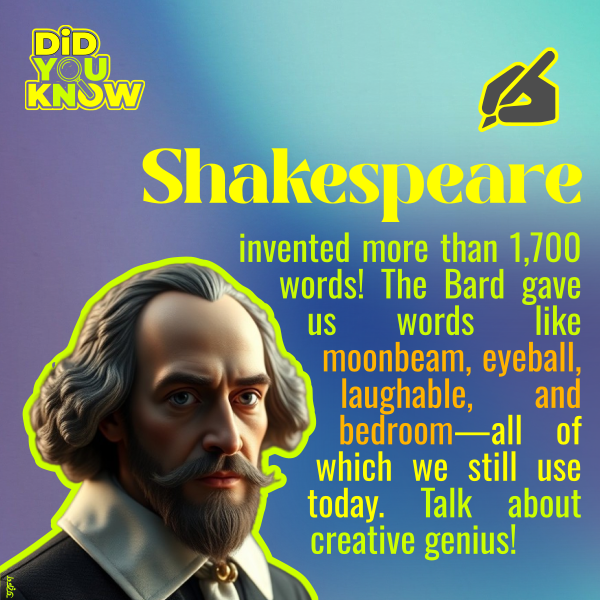

Words That Shaped the English Language
William Shakespeare, affectionately known as The Bard, contributed more to the English language than just timeless plays and sonnets—he also invented over 1,700 words still in use today! Terms like moonbeam, eyeball, laughable, swagger, lonely, and dawn are just a few examples of his linguistic innovations. Shakespeare’s ability to capture human emotion, behavior, and imagery in new words helped transform English into a vibrant, expressive language that resonates through the centuries.
How Did He Do It?
Shakespeare’s creative methods were as varied as his vocabulary. He often turned nouns into verbs, blended words to capture nuanced ideas, and crafted entirely new terms to enrich his storytelling. His inventive style gave English a distinct character, adding layers of expression and emotional depth. From tragedy to comedy, his word choices allowed audiences to connect deeply with his characters and themes, leaving an indelible mark on language.
Shakespeare’s Legacy Beyond Words
Beyond individual words, Shakespeare popularized countless phrases we use every day, like “heart of gold,” “break the ice,” and “wild-goose chase.” His linguistic legacy also extended to his mastery of rhythm and meter, which influenced poetry, drama, and prose. Shakespeare’s contributions laid the groundwork for modern storytelling and expression, influencing literature, culture, and language in ways that are still felt today.
Fun Facts
- Shakespeare’s inventiveness didn’t stop at single words; he also gave us phrases like “faint-hearted” and “foregone conclusion,” enriching conversational English.
- If not for Shakespeare, words like assassination, gloomy, and countless might not exist as we know them today.
- His expansive vocabulary helped English evolve from a regional dialect into a global language, admired for its versatility and poetic potential.
Curious About More Literary Wonders?
Visit our “Language Mysteries“ section to explore the fascinating evolution of words, the stories behind famous phrases, and how literature has influenced language across generations!

We choose not to clutter your experience with ads. If you’d like to support us, consider showing some love by liking this post on X (Twitter), Instagram or Facebook!
Share this Post, Spread the Knowledge!
